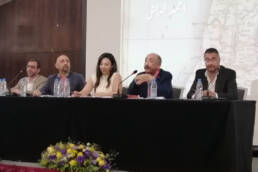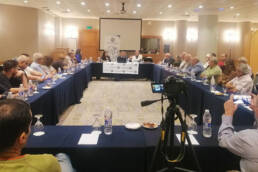The Center for Arab Unity Studies held a digital seminar on Wednesday evening, June 8, 2022, via Zoom and the Center’s Facebook page, on Parliamentary Elections in Lebanon: Internal Contradictions and External Pressures. The webinar was presented by the Director-General of the Center, Luna AbuSweireh, who said that, “The elections took place in light of a worsening financial crisis that Lebanon has not witnessed before, and rapid changes in the international scene and regional alliances.” The seminar was moderated by Professor Fares Abi Saab, Editorial Director of the Center. The three main speakers were Professor of Political Science at Cairo University Hassan Nafaa, Professor of Political Science at the Lebanese University Hossam Matar, and researcher at the International Information Company Muhammad Shams El-Din.
Abi Saab considered that reading the electoral scene in Lebanon must take place in light of the following critical issues: the crisis of the political system and the ruling class in Lebanon, the economic and financial collapse, the official Arab system, the trend towards ending the Arab-Israeli conflict and normalization with Israel, and the conflict over the resistance in Lebanon. Abi Saab emphasized that these issues were “strongly present in the latter parliamentary elections battle in Lebanon.”
Mr. Muhammad Shams El-Din focused on the indications of low voter turnout – which amounted to 49.2 percent, a very slight decrease from the previous electoral cycle, despite the electoral money that flooded 7 prominent electoral districts. The low voter turnout reflected, according to Shams El-Din, the indifference of the Lebanese voter to the old political class. On the one hand, the voters lacked confidence in the alternative that is “the forces of change and opposition”, which would not have emerged without the absence of the Future Movement in running the elections, and that’s how “all parties lost in these elections”, according to Shams El-Din. In his opinion “If the forces of change candidates had credibility with the people, and if the electoral law was different, the change would have taken place.”
Dr. Hussam Matar discussed the repercussions of the elections, the most prominent of which- in his opinion- was the decline of the consensual logic that had been running the political process for a long time in Lebanon and the transgression of the charter, which would increase tensions within the constitutional institutions and delay the required decisions. This matter, according to Matar, will render the institutions powerless, and then the conflict will return to the street. He expected the main reform issues to be stalled in the coming period, with minor exceptions, because access to fundamental reforms requires a major international settlement.
Dr. Hussam Matar pointed out that the conflict is now revolving around the executive authority in Lebanon, which will determine the direction of the Lebanese crisis, whether for an explosion or a settlement. Matar said that the regional balance of power necessitates how Hezbollah determines its internal approach, he added that “Hezbollah does not take the initiative to break internal coexistence, because it is in its interest to maintain a position of building the power equation to deter Israel from launching any aggression, but it will have to confront if this coexistence is broken, which will harm the resistance project and its ability to deter the Zionist aggression.”
Dr. Hassan Nafa’a’s intervention focused on the unique nature of the Lebanese system, which cannot keep a distance from what is happening in the Arab world, since 1958 until now. He considered that if there existed a true “Arab official regime”, it would rush to help Lebanon after the explosion of the port of Beirut on August 2020, and the severe economic crisis, but according to Nafaa “the Arab world is divided against itself regarding the Arab-Israeli conflict, and hence all the way to the Lebanese crisis.” He also considered that the return of the United States to the negotiating table over Iran’s nuclear file may lead to breakthroughs, because the opposite means an increase in polarization in Lebanon.
Dr. Hassan Nafaa stressed that Lebanese resistance does not defend Lebanon only but rather the Arab resistance as a whole, pointing out to be careful with “assuming that the American role is declining in the region” because the Ukrainian crisis showed that “the American – Israeli alliance is still the strongest and the main driver of the region’s events, including the conflict over Lebanese gas, and the United States is still taking on the roles that Israel cannot play,” he said.
In conclusion, the Director-General of the Center, Luna AbuSweireh, expected more complications in the internal and regional Lebanese scene in the coming period, in addition to the absence of reform breakthroughs, which will prolong the crisis and increase its impact on the Lebanese citizen, considering that “the weakness in Lebanon is a reflection of the weakness in the Arab world” in light of accelerating pace of normalization with the Zionist entity.
The webinar is available on our YouTube channel
#Lebanese_crisis #elections #elections_2022 #elections_of_Lebanon #caus #center_for_arab_unity_studies
مركز دراسات الوحدة العربية
فكرة تأسيس مركز للدراسات من جانب نخبة واسعة من المثقفين العرب في سبعينيات القرن الماضي كمشروع فكري وبحثي متخصص في قضايا الوحدة العربية
We appreciate your support
SUPPORT THE CENTRE FOR ARAB UNITY STUDIES
The Centre is reaching out for its friends and readers for support, whether by ordering our publications and paying for them in hard currency, or through donations. The Centre welcomes any support to boost its resiliency, to ensure its survival, the continuation of its legacy and its commitment to tackle issues facing the Arabs and the Arab world.



